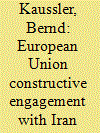| Srl | Item |
| 1 |
ID:
082261


|
|
|
|
|
| Publication |
2008.
|
| Summary/Abstract |
In 2002, the European Union (EU) announced that it would enter a Trade and Cooperation Agreement with Iran. The deepening of economic and diplomatic relations between the EU and Iran was, however, linked by the Commission to progress in four areas: human rights, non-proliferation, terrorism and the Middle East Peace Process. This article argues that the current focus on efforts to find a solution to Iran's nuclear ambitions has overshadowed the dynamics of EU human rights diplomacy towards that country. Unlike diplomatic pressure on the non-proliferation issue, the EU-Iran Human Rights Dialogue did not only enjoy great support by politicians and human rights activists, but did indeed result in changes in legislation and policies aimed at the protection of human rights. Europe's multi-track strategy allowed Iranian activists and members of the legal profession to approach the notion of human rights from within the Shi'a notion of justice and rationality and thus managed to assert Islamic roots for human rights and uncovered the very secular realities of human rights violations in the Islamic Republic. The Dialogue was launched at a critical juncture in Iran's reformist movement and helped likeminded politicians, particularly the executive and parliament, to gain momentum domestically and credibility internationally. While efforts at reform were and still are often impeded by the country's competing centers of power, this article argues that efforts to promote and protect human rights in Iran must not be sacrificed for concerns over the nuclear issue.
|
|
|
|
|
|
|
|
|
|
|
|
|
|
|
|
| 2 |
ID:
082262


|
|
|
|
|
| Publication |
2008.
|
| Summary/Abstract |
Numerous observers have noted that a feminist generation of educated young women appears to be emerging in Iran, despite the anti-feminist discourse of the Iranian government. Evidence from three surveys conducted in 2000-2003 confirms and complicates these observations. Educated young women are significantly more likely to espouse feminist attitudes of various sorts than other Iranians, including educated young men. In addition, educated young women are significantly more likely to work outside the home, marry later, give birth later, have fewer children, and have more egalitarian marriages than other Iranian women. However, surprising proportions of older Iranians also espouse feminist attitudes, and a majority of respondents in one nationally representative sample of urban Iranians identify themselves as proponents of women's rights
|
|
|
|
|
|
|
|
|
|
|
|
|
|
|
|